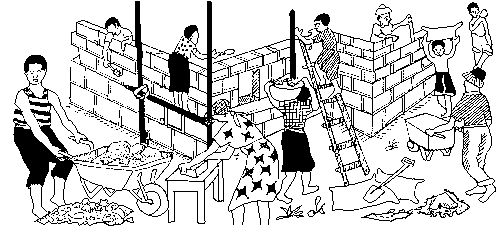|
Español
Français
Português
Three Minutes Description
The Community Empowerment Collective is a not-for-profit association located world wide which works on the Internet to produce, translate, and make available free training material for strengthening communities. Community Empowerment methodology starts with the idea that capacity can not be built (social engineering), but the community can be stimulated to develop itself. The training emphasises “How-to” rather than theory and research about the empowerment methodology. It aims to write at a level of language for middle school leavers, and provides an extensive set of key words to cover the vocabulary they might not yet know.
Development means getting larger and more complex. Empowerment means becoming stronger. While the two are different by definition, they are intricately interlinked. When we give everything to a community, and do everything for it, it becomes, metaphorically speaking, a cultural couch potato. The methodology is based on eight principles, six cultural or social dimensions, and sixteen elements of strength.

The following are the eight principles of empowerment:
- The balance of power (opinion makers and leaders, not merely the demographic majority) must desire the community to become more self reliant and willing to make efforts and sacrifices to become so Without this, the mobiliser would be wasting time and better employed in another community;
- An experienced and/or trained agent must be available to intervene to stimulate and guide the community to organize and take action to overcome poverty and become more self reliant;
- While assistance can be offered, it should not be charity assistance which promotes dependency and weakness, but partnership, ie assistance and training that promotes self reliance and increased capacity;
- Recipient organisations or communities should not be controlled or forced into change, but professionals trained as activists or mobilisers should intervene with stimulation, information and guidance, persuasion and facilitation;
- Organisms become stronger by exercising, struggling, and facing adversity. Empowerment methodology incorporates this principle for social organizations;
- Hands on participation, especially in decision making, by the recipients, is essential for their increase in capacity. Decisions can not be made for or on behalf of the community;
- A substantial proportion (it varies) of the resources needed for a community project (ie the action) must be provided by the community members themselves;
- We need to aim at the participants from the beginning taking full control, exercising full decision making, and accepting full responsibility for the actions which will lead to their increased strength.
The six cultural dimensions the mobilizers are trained to use are:
- Technological Dimension,
- Economic Dimension,
- Political Dimension,
- Institutional Dimension,
- Value Dimension and
- Worldview Dimension.
The web site also provides many practical descriptions of how to do things
related to empowerment, ranging from gender balance, income generation, functional literacy, community mobilization, enabling environment, participatory appraisal, through planning, project design, management training, proposals, report writing, to applications in various sectors.
 Please put your comments and queries in the Discussions Page. Click on the discussion tab at the top of this page.--Phil Bartle 06:41, 23 May 2009 (UTC) Please put your comments and queries in the Discussions Page. Click on the discussion tab at the top of this page.--Phil Bartle 06:41, 23 May 2009 (UTC)
|
